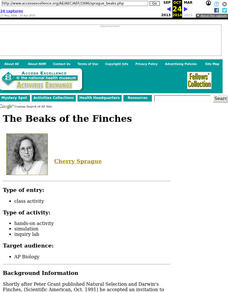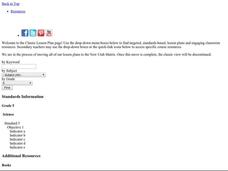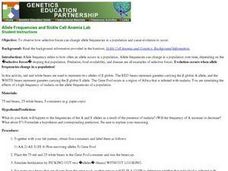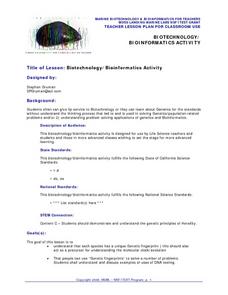Curated OER
Evolution Study Guide
Thirty short-answer questions comprise this detailed review of evolution theory. Many of the questions ask scholars to define vocabulary. Because short answers are required, this worksheet will take some time to complete. You could give...
Serendip
Golden Rice – Evaluating the Pros and Cons
More than half the world's population eats rice as a daily staple ... imagine if that rice could prevent illness. Scientists genetically engineered rice to include vitamin A for just that purpose. However, room for debate still exists....
Cold Spring Harbor Laboratory
Mendelian Laws Apply to Human Beings
Why are so many inherited diseases more prevalent in populations of specified races? Scholars learn about pedigrees and genetics using a reading, an animation, primary sourced letters, a short video, a biography, a guided practice...
Howard Hughes Medical Institute
Biochemistry and Cell Signaling Pathway of the Mc1r Gene
How do mice have so much fur color variation over generations? Scholars illustrate protein structures based on amino acid sequences. Then, they analyze the signaling pathway in different-colored mice populations. This allows them to...
Curated OER
Bears of Banff
Students pretend they have just entered a national park. They imagine that the park borders are all impassable mountains, and students will play the role of grizzly bears. Students list three things every animal needs to survive, in this...
Curated OER
The Beaks of the Finches
Students become birds and are given "beak-types". After completing the simulation, students relate results to adaptations and natural selection. Extensions of the simulation allow for comparative results and include population genetics.
Curated OER
People Are Like Peas in a Pod
Students experiment with peapods to show the diversity of individual within a population. They examine dominant traits, recessive traits, genotypes, and phenotypes and show the process of making a Punnett Square.
Curated OER
Toothpick Fish
Young scholars experiment with genes and environment for a population of "Toothpick Fish."
Curated OER
Natural Selection Foldable
Pupils examine and identify examples of species that developed as a result of immigration, genetic drift, and adaptive radiation. They conduct Internet research and define key vocabulary terms, and use their species example on their...
Curated OER
Rock, Paper, Scissors
Fifth graders explore genetic traits. In this genetic traits lesson, 5th graders investigate dominant and recessive traits. Students identify similar traits between a parent organism and its offspring.
Curated OER
Variety is the Spice of Life
Students explore Gregor Mendel's work with genetics. They complete a survey of their friends and family in order to identify dominant and recessive traits. Once their surveys are complete, students discuss the ways in which dominant...
Curated OER
Case of the Threespine Stickleback
Young scholars examine why some freshwater populations of stickleback fish. In this macroevolution lesson students read a study packet then answer questions.
Curated OER
From Restriction Maps to Cladograms
Biology aces analyze restriction maps to determine the relationships among different primate species and then complete a cladogram. Preface this lesson with an explanation of how restriction enzymes are used to create the DNA maps....
Curated OER
Genetic Pamphlet with a Purpose
High schoolers design a human genetic condition pamphlet which they present to the class and then take to a doctor's or pediatrician's office.
Curated OER
Survival of the Fittest – Battling Beetles
Students explore natural selection. For this genetic adaptation lesson plan, students discover why certain traits continue and some traits disappear. Students discover how species evolve and change. Resources are provided.
Curated OER
A Whale of a Problem
Students evaluate the possible causes contributing to the decline of the killer whale population from a number of differing perspectives. They present their findings in a talk show format and in letters of advocacy regarding
Curated OER
Hardy-Weinberg Equilibrium
High schoolers investigate how Hardy-Weinberg Equilibrium is established and what assumptions and conditions are necessary to reach Equilibrium. They model alleles using materials such as index cards, M & M's and goldfish.
Curated OER
Producing a Strain of E. coli that Glows in the Dark
Students observe the experimental process called bacterial transformation and demonstrate phenotype changes in bacteria that have been transformed with an antibiotic-resistance gene and a metabolic marker. They create a luminescent...
Curated OER
Punnett Squares/Genetics
Ninth graders complete a monohybrid cross and a dihybrid cross. In this biology activity, 9th graders predict the traits of offspring using the Punnett square. They differentiate recessive and dominant genes.
Curated OER
Allele Frequencies and Sickle Cell Anemia Lab
Students investigate how selective forces like food, predation and diseases affect evolution. In this genetics lesson, students use red and white beans to simulate the effect of malaria on allele frequencies. They analyze data collected...
Curated OER
Clipbirds
Students attempt to pick up various objects with a wide variety of beaks, including scissors, spoons, etc.
Curated OER
Biotechnology/Bioinformatics Activity
Young scholars demonstrate the genetic principles of Heredity. They discover that each species has a unique Genetic fingerprint and that people can use "Genetic fingerprints" to solve a number of problems. They discuss examples of uses...
National Center for Case Study Teaching in Science
In Sickness and in Health
Based on family history, how likely is it that a couple's children will have a recessive disease? In an in-depth, but easy-to-follow case study, future geneticists learn the story of Greg and Olga, who are hoping to have children, but...
Curated OER
Managing Wildlife
Students discuss the current conditions of wildlife in New England. Students explore how animals are tracked and how their population is managed.
Other popular searches
- Population Genetics 11 Grade
- Population Genetics Bunnies
- Population Genetics Lab
- Population Genetics Rabbit

























